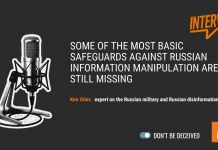The Russian-Ukrainian war continues, and the Kremlin’s demand for propaganda efforts remains consistently high. The main mistake may be underestimating the power of propaganda and its significant impact on the moods within Ukraine, in Europe, and the world at large. Certain propaganda trends emerged as early as 2022-2023, and some have become noticeable today.
Constantly increasing the capacity of information and propaganda troops. Fake news is the cheapest and most effective weapon of mass influence. The war between the world’s largest state and the largest country in Europe is not about territory, but about mastering the minds of millions of Ukrainian citizens. Vladimir Putin, with his phantasmagoric vision of Ukrainian history and his willingness to “take care of the Ukrainian people” while destroying the Ukrainian state, is a very telling example of this chauvinistic schizophrenia. I emphasize that we are talking about the coordinated actions of the state information machine and formally private media, which work within the framework of the same information strategy. More than $1.4 billion has been allocated to finance state propaganda in 2025, which is an astronomical figure.
Using contradictions within the military and political leadership of Ukraine. The situation around the dismissal of Valeriy Zaluzhnyi from the post of Commander-in-Chief of the Armed Forces of Ukraine was used by Russian propaganda to the maximum. To the factor of visible political jealousy on the part of the Office of the President of Ukraine, Russian propagandists skillfully added powerful rumors, obsessive fakes, and repeatedly used carpet bombing of the Ukrainian information space with lies. The lack of effective communication with its own citizens in this matter had delayed, but significantly negative consequences for the Zelenskyy team. Unfortunately, for various reasons, the Ukrainian information space is very vulnerable to Russian propaganda and disinformation influence.
A manipulative desire to impose the thesis of Volodymyr Zelenskyy’s “illegitimacy”. Russian propaganda has been calling Volodymyr Zelenskyy “illegitimate” for more than six months. The reason is that the term of office of the President of Ukraine is 5 years, and new presidential elections were supposed to be held in May 2024. However, it is impossible to hold them under martial law, and the Kremlin is well aware of this. Putinoids, it should be emphasized, are diligently studying the legislation of other countries to use it for their own purposes.
The Ukrainian government made a mistake by not requesting an explanation from the Constitutional Court regarding the presidential election and the reasons for extending Volodymyr Zelenskyy’s term. He himself would have benefited politically if he had repeated his thesis at the beginning of his term: “I was elected for one term.” However, the main reason for the Kremlin’s propaganda frenzy about Volodymyr Zelenskyy’s “illegitimacy” is different: Russia is trying to shift attention away from its own presidential election. Voting for Vladimir Putin in March 2024 was also held in the occupied territories of Ukraine, which is a gross violation of international law. Therefore, Putin’s statements such as “I will sign a peace agreement only with a legitimate president” should be addressed to him.
Manipulations around mobilization in Ukraine. Russia is well aware that disrupting mobilization activities in Ukraine creates serious advantages for it. Therefore, the fight against mobilization into the Armed Forces is a top priority for the Kremlin. Hence, the scaling up of mistakes in the work of the TCC, the hyperbolization of mistakes made, and the dissemination of negative information via telegram channels. Another Russian know-how is anti-mobilization rallies involving Ukrainian men in the EU, which also undermine bilateral cooperation.
Kursk information anomaly. The successful actions of the Armed Forces of Ukraine in the Kursk region of Russia have caused an interesting information trend. For example, Vladimir Putin is extremely reluctant to comment on the course of hostilities there, limiting himself to generalities. A significant information burden has fallen on Anti Alautdinov, Kadyrov’s associate and one of the heads of the Main Military-Political Directorate of the Russian army. His stories are mostly laughable. However, Russian propagandists also have “successes”: spreading unconfirmed information about the deaths of a huge number of pregnant women and children in the Kursk region, and the creation of concentration camps by the Ukrainian military. However, for some reason, the facts of looting are observed in the settlements that are still controlled by the Russians.
Discrediting the cooperation between the West and Ukraine in repelling Russian aggression. The desire to cut off the flow of military, technical, and financial assistance to Ukraine is very important to the Kremlin, and they see it as one of the keys to success. The outright lies of the spring-summer of 2022 are being replaced by video footage of the destruction of Western equipment. The Kremlin propaganda is trying to show events that are common to large-scale military operations as key successes of Russian soldiers.
It is unfortunate that Polish-Ukrainian relations in this context are also in the crosshairs of Russian propaganda. For Putin, blocking the Polish-Ukrainian border and stirring up enmity between Poles and Ukrainians is a key task, as Poland remains a reliable strategic partner and logistics center for Ukraine. Therefore, the Kremlin is trying to succeed by focusing its propaganda on the junction between Poland and Ukraine, undermining this alliance.
Another issue is the participation of Viktor Orban and Robert Fico in the Kremlin’s political games. By their behavior, both politicians demonstrate not only the desire to receive dividends for cooperation from Putin, but also show that the EU’s democratic procedures are losing out to Russian decisions in terms of speed and quality of implementation. This is in fact a dangerous challenge for the European Union, a populism with geopolitical implications that could lead to the loss of the EU’s political face.
Distortion of information about Ukrainian prisoners of war. The executions of Ukrainian prisoners of war (more than a hundred were executed in 2024) are part of the state policy of dehumanizing Ukrainians, which has been implemented in Russia for many years. In this way, the Russian military is trying to intimidate Ukraine’s defenders. However, Kremlin propaganda is forced to respond to the spread of information about its own war crimes. Thus, accusations of Ukraine’s unwillingness to exchange prisoners are accompanied by videos of Ukrainian prisoners in captivity and their meetings with their families. This is very reminiscent of the stories about the exemplary Theresienstadt concentration camp in Nazi Germany. It is therefore necessary to recall the deaths of civilians in Russian captivity (journalist Victoria Roshchyna, mayor of the city of Dniprorudne Yevhen Matveev) and the continued abduction of Ukrainian children.
Attempts to use the terrorist attack in Crocus City Hall totheir advantage . Russian propaganda uses the terrorist attack on the shopping center near Moscow with particular cynicism. The Central Asian natives named by the investigation as the attackers were tortured, Russia has significantly changed its migration policy, putting people from post-Soviet republics before a choice – either to return home or to join the Russian army. The version about the “Ukrainian trace” in this terrorist attack was personally promoted by people who came from the Soviet punitive system – Vladimir Putin, Alexander Bortnikov, and Nikolai Patrushev. Their loud statements were supposed to compensate for the obvious lack of evidence of terrorists’ cooperation with Ukrainian special services.
Continuation and modernization of nuclear blackmail. The Kremlin is well aware of the potential impact of the threat of using a nuclear bomb on the European community and uses it very skillfully. That is why the information about the deployment of nuclear weapons in Belarus, which is actively relayed by Alexander Lukashenko, has been supplemented by exercises, revision of Russia’s nuclear deterrence doctrine, and even the use of the Oreshnik missile. All of these methods seem to emphasize Putin’s insanity and his willingness to spread nuclear winter on planet Earth. However, these maneuvers are more likely to be classified as psychological pressure, with the help of which the Kremlin’s master is trying to elevate his own importance.
The use of subordinate Belarusian propagandists. Belarus under Lukashenko’s leadership is actively involved in propaganda against Poland and other NATO countries. It is accused of excessive militarization and other aggressive manifestations, and the incidents that occurred with the Polish Army are exaggerated. The journalist Andrzej Poczobut, one of the leaders of the Union of Poles of Belarus, can be called a hybrid prisoner held in a Belarusian prison. However, Belarus welcomed Judge Schmidt, who fled Poland due to compromising circumstances. By making attacks against Poland mainly in telegram channels and on state television, Lukashenka’s regime imitates vigorous activity and allied loyalty.
P.S. The above list of manifestations of Russian propaganda in 2024 is not exhaustive. Manipulation and speculation, the desire to use natural disasters and problems for their own purposes, the promotion of xenophobia and the use of “useful idiots,” the desire to spread influence in the countries of the global South were certainly present. Therefore, we must not only record the manifestations of the Kremlin’s propaganda activities, but also think about how to counter them by developing critical thinking, media literacy, and forming an offensive trend in confronting the Kremlin.
Yevhen MAHDA





